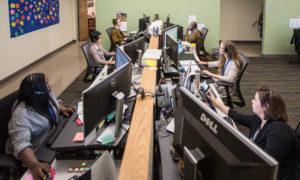TRANSPARENCIES
a monthly newsletter from Integral Care [printfriendly]
a monthly newsletter from Integral Care [printfriendly]

When people have crisis helplines located in their area, they can be quickly connected to local resources and care that support their ongoing mental health needs. Crisis calls are answered faster and outcomes are better. With the right treatment at the right time, people can recover from a mental health crisis.
Starting this spring, more people in Texas will be able to connect with crisis helplines in their communities thanks to the National Suicide Prevention Lifeline’s State Capacity Building Initiative. Integral Care is proud to be one of the recipients of this $3 million, 2-year grant, which will transform and expand 4 Local Mental Health Authority (LMHA) helplines in our state.
Currently, only 31% of calls to the National Lifeline originating in Texas are answered in state. 69% of calls were transferred to out-of-state call centers with more capacity but less access to local resources. Our sprawling state has more calls unanswered locally than any other state. This grant aims to improve that shortfall, raising the in-state answer rate to a minimum of 70%, with a goal of 90% or more. Texas Health and Human Services (HHSC) will administer the grant funding to My Health My Resources of Tarrant County, Harris Center for Mental Health and IDD, Emergence Health Network in El Paso County and Integral Care. In 2021, over 113,000 (of the over 161,000 projected) Lifeline calls from Texas residents will be answered by these 4 centers
Integral Care’s 24/7 Helpline staff answered over 69,000 calls in Fiscal Year 2019. Over 8,000 of those calls were routed from the National Suicide Prevention Lifeline but originated in Travis County. Integral Care’s overall answer rate exceeded 95%. It is throughout the state, however, that the answer rate for the National Lifeline’s Texas calls is low.
With the grant funding, Integral Care will take calls from 49 counties and expand access to crisis services staff across the state. This means increased staffing for our 24/7 Helpline. As always, each call our Helpline answers offers free, confidential emotional support and connection to appropriate follow-up care. Help is available in 15 languages, through trained medical interpreters.
This initiative is one critical step toward tackling a disturbing statistic – that the U.S. suicide rate is at its highest since World War II. With this grant, more people calling the National Lifeline will experience shorter wait times and have more efficient routing to local care, nearby emergency centers and other necessary supports – elevating current suicide prevention efforts.
 Another highly anticipated step towards curbing the current suicide rate is happening on the national stage. In mid-December, the Federal Communications Commission (FCC) unanimously voted to create a
Another highly anticipated step towards curbing the current suicide rate is happening on the national stage. In mid-December, the Federal Communications Commission (FCC) unanimously voted to create a
3-digit number for the National Lifeline calls (currently reached by dialing 11 digits). We all know to call 911 in an emergency. Soon, we will know 988 as the number to call for a mental health crisis. The FCC now moves to a period of public comment before finalizing the rules and making the number a reality, an 18-month process.
If you or someone you know is experiencing a mental health crisis, or just having a bad day, please call our 24/7 Helpline at 512-472-HELP (4357). We are here to support you. For more information about suicide prevention in Austin-Travis County, visit our Suicide Prevention webpage.

David Evans
Chief Executive Officer
Mental Health First Aid
What would you do if someone went into cardiac arrest? CPR doubles or triples someone’s chance of survival. Just like CPR, Mental Health First Aid (MHFA) can save a life. The 8-hour class provides a person the basic tools to help someone showing signs of mental illness or substance use disorder, or experiencing a mental health crisis. The takeaway? Knowing how to recognize when someone needs help, how to listen to and discuss sensitive subject matter and then connect the person to help.
“In a nation facing a crisis in care for people with mental illnesses and addictions, widespread training in Mental Health First Aid for every American increases the chance that people will get the initial support they need and crisis can be averted.” – National Council for Behavioral Health
Integral Care began offering MHFA in 2006. Since then, we’ve trained over 10,000 Central Texans – including Capitol staffers, representatives from the City of Austin, Austin/Travis County Health and Human Services, University of Texas, Austin Community College, Huston-Tillotson University, many private businesses and nonprofit organizations.
Integral Care offers a variety of specialized trainings – from Youth MHFA for people who work with youth and young adults to Public Safety MHFA for first responders and corrections officers to Older Adult MHFA for anyone who works with people experiencing later-life issues.
In 2019, we launched MHFA for Veterans, Military Members and Their Families, which focuses on the unique experiences and needs of this population. Also in 2019, Integral Care and East Austin College Prep were 1 of 35 teams in the country chosen for a teen Mental Health First Aid pilot, sponsored by the National Council on Behavioral Health and Lady Gaga’s Born This Way Foundation.
No matter who you are – a health care professional, policy maker, hairdresser or bus driver – we encourage you to take the class. Learn the tools and save a life.
Teen Mental Health First Aid & East Austin College Prep
When teenagers experience a problem, who’s the first person they turn to for support? Generally, another teenager, a peer. That’s why teen Mental Health First Aid (tMHFA), which trains teens to recognize a developing mental health or substance use issue and help their friends, is so critical.
This fall, Integral Care and East Austin College Prep (EACP) launched the teen Mental Health First Aid pilot. Over 5 weeks, the entire sophomore and junior class at EACP (120 students) learned essential tools to help their peers – like how to engage in conversation with a friend who may be in need or crisis, how to use the Crisis Textline, and the all-important step of involving a responsible and trusted adult.
“This training allowed for our students not only to gain knowledge and awareness on the subject of mental health, but it most importantly allowed a safe space for conversations that they may not have been able to have elsewhere. I can already see the positive impact that the training has had on our students.” – Destinee Wells, East Austin College Prep teacher
According to Integral Care MHFA Program Manager Aaron Evans and tMHFA trainer, students were curious and invested in learning more. They courageously participated, opened up and engaged in tough conversations. Early education on the topic of behavioral health also reduces stigma and helps young people intervene when a peer needs help.
“I feel like this program has opened my eyes a lot on mental health. I am ready to use everything I have learned in real-life situations.” – Brittany, a junior at EACP
Integral Care stands behind Lady Gaga’s mission. We hope to see tMHFA spread to other schools across our community and the nation.
December 2019: A Year of Thriving Care & Collaboration
November 2019: Teamwork and Collaboration Impact Homelessness in Travis County
October 2019:Making Strides for World Mental Health
September 2019: Taking Steps to Recovery Support
August 2019: Working Together for Child & Youth Mental Health
July 2019: Legislative Wrap-Up – Some Bipartisan Wins for Healthcare
June 2019: Strengthening Access for Veterans and the Entire Military Family
May 2019: Women and Mental Health
April 2019: Legislative Session Status Report
March 2019: Making Opportunities for Recovery More Accessible
February 2019: Recovery is Possible
January 2019: Stronger Outcomes Through Collaboration
December 2018: Looking ahead to the 86th Texas Legislature
November 2018: How Tech is Changing the Face of Mental Health
October 2018: A Few Questions Could Help Save a Life
September 2018: Anyone Can Save a Life
August 2018: A Milestone Moment
July 2018: Equity in Mental Health Care for All
June 2018: Expanding Services for Veterans
May 2018: Your Mental Health Toolkit
April 2018: Time of Terror Calls for Increased Emotional Support
March 2018: Stopping the cycle of incarceration for individuals with mental illness
February 2018: Equity in mental healthcare for everyone
January 2018 : Improving Mental Health Through Partnership & Collaboration
December 2017: Strength Through Community
November 2017 : Healthy Lifestyles Improve Well-Being
October 2017 : National Child Health Day
September 2017 : Strengthening Families and Communities